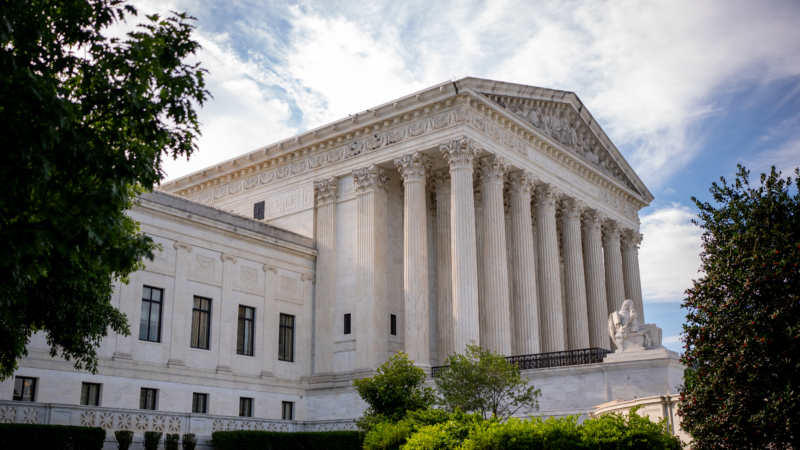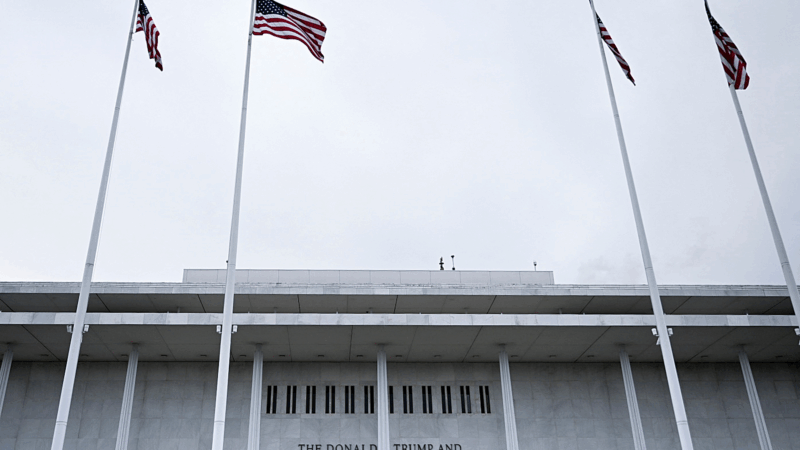Supreme Court backs Trump in controversial deportations case
The U.S. Supreme Court on Monday backed the Trump administration’s efforts to continue deporting what it says are Venezuelan gang members. In an unsigned order, the court’s conservatives threw out a lower court order that prevented the administration from continuing its deportations under the controversial Alien Enemies Act of 1798.
The order finds that the men challenging removals under the Alien Enemies Act should have contested their arrests in the districts they were detained through individual habeas petitions. A habeas corpus petition is filed to individually challenge the legality of a person’s detention.
The initial lawsuit challenging the order, from the American Civil Liberties Union and Democracy Forward, instead sought to block removals of all Venezuelans who may have been affected by the Alien Enemies Act.
The order marks a win for the Trump administration, even if temporary, and it could well be a harbinger of things to come as the administration continues to clash with federal courts and assert the executive’s dominance over the other two branches of government.
However, the majority’s order also found that any person subject to removal under the Alien Enemies Act is subject to judicial review. People must also get adequate notice to challenge deportations in court.
“More specifically, in this context, AEA detainees must receive notice after the date of this order that they are subject to removal under the Act. The notice must be afforded within a reasonable time and in such a manner as will allow them to actually seek habeas relief in the proper venue before such removal occurs,” according to the majority opinion. The Supreme Court said such petitions must be resolved in the districts where people are detained.
It’s unclear what the order means for people who were already deported to El Salvador under the Alien Enemies Act, after their lawyers said they did not get enough notice of removal. Justice Kavanaugh penned his own concurring opinion.
“We are disappointed that we will need to start the court process over again in a different venue, but the critical point is that the Court rejected the government’s remarkable position that it does not even have to give individuals meaningful advance notice to challenge their removal under the Alien Enemies Act. That is a big victory,” the ACLU’s Lee Gelernt said in a texted statement.
Justice Sonia Sotomayor penned a dissenting order on behalf of the court’s liberal justices, joined by Justices Elena Kagan and Ketanji Brown Jackson. Justice Amy Coney Barrett joined for parts of the order.
Sotomayor’s dissent found that the court’s legal conclusion is “suspect,” and it rules in the government’s favor “without mention of the grave harm Plaintiffs will face if they are erroneously removed to El Salvador or regard for the Government’s attempts to subvert the judicial process throughout this litigation. Because the Court should not reward the Government’s efforts to erode the rule of law with discretionary equitable relief, I respectfully dissent.”
Justice Jackson penned her own dissent as well.
Alien Enemies Act proclamation
The dispute began March 15 when President Trump signed a proclamation ordering the removal of individuals who the administration said were members of the Venezuelan gang Tren de Aragua. The State Department designated TdA as a Foreign Terrorist Organization on Feb. 6.
Within hours, the administration began filling planes with alleged gang members headed for a prison in El Salvador, where they were detained. Meanwhile, five other alleged gang members, who had not been deported yet, sued in federal court to stop the administration in its tracks.
Almost immediately, U.S. District Judge James Boasberg in Washington, D.C., temporarily halted the deportations and told the administration to bring back the planes that were already en route to El Salvador.
But the administration refused to turn the planes around, claiming that it was not legally required to do so, and refusing to answer many of Boasberg’s questions, citing national security grounds as the justification. This despite the fact that Boasberg served for seven years on the super-secret Foreign Intelligence Surveillance Act court, becoming presiding judge in 2020 and 2021. And from 2020 to 2025, he served as chief judge of the United States Alien Terrorist Removal court.
By granting the stay on Monday, the court also appeared to support Trump’s invocation of the controversial Alien Enemies Act of 1798, which had only been used three times in U.S. history before now, and always during a war declared by Congress. The Trump administration claims that while the U.S. is not officially at war with Venezuela, the gang is intertwined with the Venezuelan government, and therefore the gang’s presence in the U.S. is an “invasion” for purposes of the Act.
One issue that Boasberg found particularly problematic is that the government held no hearings in which the alleged TdA members could dispute their removal from the country. The judge noted that even when the Alien Enemies Act was used during World War II against Japanese, German, and Italian citizens in the U.S., they were at least given their day in court.
Concerns about due process
In the days since then, the consequences of not providing due process have continued to play out. An ICE official conceded on March 31 that the agency incorrectly deported a Salvadoran man living in Maryland due to an “administrative error.”
Nonetheless, Trump and other government officials have called for Boasberg’s impeachment, impugning his integrity and contending that he lacked the authority to stop the Trump administration from carrying out its agenda.
Those statements prompted Chief Justice John Roberts to issue a rare statement rebuking Trump, which read: “For more than two centuries it has been established that impeachment is not an appropriate response to disagreements concerning a judicial decision. The normal appellate review process exists for that purpose.”
Following the chief justice’s advice, the administration first asked the federal court of appeals in Washington, D.C., to block Boasberg’s order and allow the deportations to continue. By a 2-1 vote, the appellate court refused to do that.
Judge Patricia Millett, an Obama appointee, condemned the administration’s failure to provide “even a gossamer thread of due process” to the deportees before removal to a Salvadoran jail “notorious” for its “human rights abuses.”
Judge Karen Lecraft Henderson, a George H.W. Bush appointee, concurred, and addressed the limits of the executive branch’s power over national security issues, saying: “Sensitive subject matter alone does not shroud a law from the judicial eye.” In dissent, Judge Justin Walker, a Trump appointee, cautioned against interfering with “delicacies of diplomatic negotiation,” such as those between the American and Salvadoran governments in this case.
After losing in the appeals court, the Trump administration immediately appealed to the Supreme Court, contending that the president has broad discretionary authority on national security matters, which federal judges should not second-guess. The administration urged the Supreme Court to allow the deportations to resume immediately to ensure the safety of the American people.
On Monday the court agreed to do that. Technically, the Supreme Court’s action allowing deportations to resume under the Alien Enemies Act is not a final decision. But it is at minimum unlikely to reverse course until a future date.
The decision is only the latest in a tsunami of cases challenging Trump’s executive orders to date. As of March 28, federal district courts had issued 40 orders blocking the Trump administration’s agenda, and Trump has not even reached his first 100 days in office. That is nearly three times as many court orders as were issued during the first three years of the Biden administration.
NPR’s Jasmine Garsd contributed to this report.
Veteran actor T.K. Carter, known for ‘The Thing’ and ‘Punky Brewster,’ dies at 69
T.K. Carter gained fame as Nauls the cook in John Carpenter's 1982 horror classic, "The Thing."
Who is Reza Pahlavi, the exiled Crown Prince encouraging demonstrations across Iran?
In exile for nearly 50 years, Iran's Crown Prince Reza Pahlavi has issued calls urging Iranians to join protests sweeping the country. But support for him may not be clear cut.
US launches new retaliatory strikes against ISIS in Syria after deadly ambush
The U.S. has launched another round of strikes against the Islamic State in Syria. This follows last month's ambush that killed two U.S. soldiers and an American civilian interpreter.
6 killed in Mississippi shooting rampage, authorities say
The alleged gunman, 24, has been charged with murder after the Friday shootings in northeast Mississippi. The victims include his father, uncle, brother and a 7-year-old relative, authorities said.
Washington National Opera leaves Kennedy Center, joining slew of artist exits
The WNO is just the latest to say they will no longer perform at the Kennedy Center since Trump took over last year.
Ukrainian drones set fire to Russian oil depot after Moscow launches new hypersonic missile
The strike comes a day after Russia bombarded Ukraine with hundreds of drones and dozens of missiles, including a powerful new hypersonic missile that hit western Ukraine.






